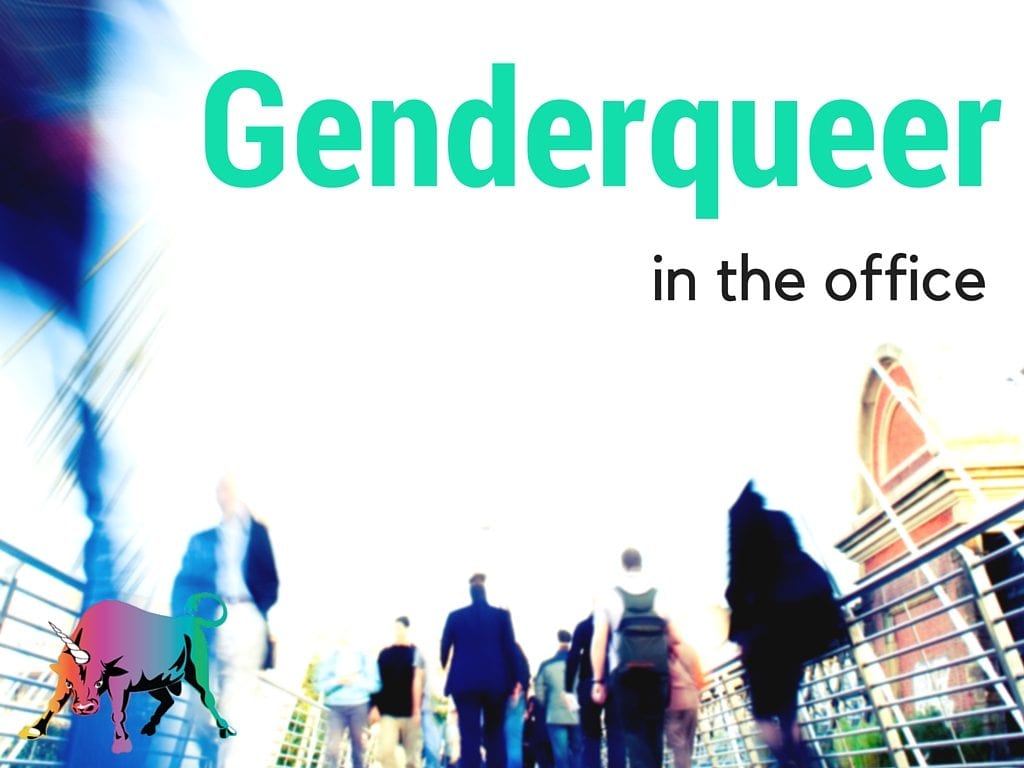Hi Jen,
Your advice (here and here) on dealing with workplace sexism has also been useful for dealing with cissexism and transphobia – I was wondering if you’d consider throwing out some specific advice for people who don’t fit the gender binary?
The majority of problems I’ve found:
– Not being hired in the first place. If it’s a case of not getting a call back/further interview when you’re qualified then it’s one of the those ‘did my being trans make a difference?’ moments. But often organisations/individuals will be quite clear: “I don’t want that in my department” etc.
– Being told to change your appearance/behaviour to a more traditionally gendered one in the hope of getting work. When I was fresh out of uni after my undergrad (before running back to uni for postgrad), I was told by the temp firm that I’d applied to that I needed to dress ‘like a woman’, and to take all LGBT-related work off my CV. In the arts admin roles I took I was told to ‘leave my politics at home’ when it came to being out as trans/dressing in an androgynous way.
– Insults in the workplace: “What is this?” (indicating my body), “you’re not like other trannies”, “you can’t be in between, you have to pick a side eventually” – and general rumours and innuendo.
– Misgendering. A lot of people will do this deliberately – some accidentally.
On the plus side, I should point out that I’ve seen a definite improvement over the past couple of years, and that there are many people who try their best, are open-minded, and who get that asking me how I have sex, or what genitals I have, just isn’t appropriate workplace chat! It’s a very mixed bag.
There is no advice in the world that is – in 2016 – going to solve every problem related to gender nonconformity in the working world. Society is definitely not there yet, as they say. But it should be! And progress doesn’t just happen as a result of the natural passage of time. People have to do shit. We are those people.
So, here are a few points that might help. Although I deeply hope that this article seems ridiculous in ten years, because we will have worked this out and HR people will be all over it.
For those who are new to this conversation, you might want to read this piece from a genderless/agender person, this profile musician Shamir Bailey, who has “no gender, no sexuality and no fucks to give,” this profile of model Rain Dove, and the UK website Beyond the Binary. Here’s a helpful post from HerCampus with some more links at the end.
That said, the ENTIRE INTERNET seems to have little advice for genderqueer people in the office: here is one very brief Reddit thread, and here is the Work and Employment section of Beyond the Binary.
If your goal is to persuade, try to persuade people of only one thing at a time
You have every right to live your truth, as they say, but – do you want to be entirely authentic or do you want to be effective in persuading people? Regrettably, these are often mutually exclusive.
You do not persuade people by presenting a worldview opposed to their own on multiple fronts. You persuade people by emphasizing multiple points of similarity and just one difference. Massage the situation until the person comes around on just that one difference. Repeat.
This requires being very selective in what you choose to express and to share about yourself. In a friendship, maybe this is terribly fake. But in the workplace, we’re all acting fake, starting with the interviewer asking, “Why do you want to work here?” and you giving an answer that is not “For the money.” In many cases, this fakeness serves to make people more comfortable, if a bit bored.
Let’s imagine a stereotypical white, straight, able-bodied, upper-middle-class cis male boss. Let’s call him Bill. There are a lot of actual Bills out there, and a lot of people who share many elements or attitudes with Bill.
Bill is possibly feeling pretty okay about himself because he just came around to being comfortable with gay marriage. Or maybe he became comfortable with gay marriage 10 years ago and feels like society should just slow down with the big changes. (An elderly relative once became FURIOUS when told not to say “colored.” He was angry because he felt he had already changed from “Negro” to “colored,” and apparently asking for more than one change per lifetime was just too much.)
So if you tell Bill, “There’s this thing called genderqueer/nonbinary, and you’re supposed to know about it and be cool with it,” Bill is very likely to become defensive or angry. (“One day it’s Caitlin Jenner, and now it’s this! People are just being ridiculous. What’s next?!”)
If you can make your language choices just about you, you will be more immediately effective. And if Bill becomes cool with you, he may come around to gender differences in general.
This is basically how I present atheism (which is not at all the same, but bear with me). It’s not like, “I am an atheist and you should learn about atheism.” That implies that I’m the one with the thing. I don’t have a thing. Religious people have a thing. I am just not doing a thing. I’m neutral. Why even call it “atheism”? Why call it anything?
So instead of saying, “I’m an atheist,” I might say, “Nope, never felt the need to join a religion.” Or how about, “Interesting! Religions sound complicated. Never felt the need.”
If you’re against the entire existence of gender (or any of a number of other interesting takes one could have), leave that aside for a moment, because that’s not really what’s relevant to your work situation. It’s your own gender presentation (or non-gendered presentation?) that is causing other people to discriminate against you, or just be really rude and weird.
So just talk about you: You never really went in for any of that gender stuff. Sounds complicated. Never felt the need. Practice shrugging at this point. Other people are the ones doing something. What are you doing? Not much. Just watching everybody else do their gender performances, really.
If you tell Bill – who unfortunately has all your employment papers, which say more about you than you would ideally want – “Yeah, my papers say female, but all that girl stuff just never really worked for me.”
What’s he gonna say? Girl stuff doesn’t work for him either.
(This is just one example and obviously doesn’t apply to all nonbinary people.)
Another example, for someone who constantly gets, “But what ARE YOU REALLY?” The least incendiary reply might be something like, “Just me, I guess. Never really got the boys-are-like-this, girls-are-like-that. I’m just all about working and enjoying life.” (A deliberate subject change into a topic soliciting broad and boring agreement – really, you like to enjoy things? – is a nice tack here. People are aggressively disagreeing, and yet you have forced them, out of sheer inanity, to agree! Enjoying things is good!)
Of course, there’s also “Not really appropriate to talk about our bits at work, right? Let’s keep it above the waist, folks.” (HAHA, JOKING NOT JOKING).
In this piece, I gave my reasoning for sometimes refraining from calling something or someone sexist or racist (and most people don’t even know what cissexist means) – when you accuse people of bigotry, they tend to dig deep and defend themselves. If you instead say, “Let’s keep it professional,” or “That’s insulting,” they’re much more likely to shape up or even apologize.
In other words
It really threatens Bill’s worldview if he now thinks he has to worry about what pronouns to use for everyone, or that his concept of gender roles (which he may have thought was very progressive!) is on the way out.
It may be good to threaten Bill’s worldview as a general matter (this is kind of what I do for fun on Facebook), but not as relating to your own job situation.
I think it might be helpful to say something like, “Of course, for most people being a man or a woman works just fine.” In some contexts, a person might pull off a grin and a “Yep, I’m one in a million!” (More like one in a few hundred, but it’s an expression.)
Overall, you can get pretty far with the attitude: “If you woke up in my position, you’d shrug and do pretty much the same thing.”
I asked a hiring manager I know at a big company about this. He said, “Oh, if I wanted to hire that person, I’d really have to make the case.” As in, everybody above him would want an explanation. The expression “making trouble” was used. I think the key in dealing with people who are just not there yet is to somehow express the message, “I’m not here to cause trouble.” I mean, of course you’re not. Your gender identity is not an act of causing trouble. It’s offensive to say that it is. But I think those are the code words.
It’s your choice whether to speak the code words.
Aim high – if shit’s going to be hard no matter what, might as well go for the big wins
You might have read NY Mag’s feature The Trans-Everything CEO, about Martine Rothblatt. The article is kind of impossible to summarize – there’s the founding a pharmaceutical company, a talking robot, a gender transition, and a recalibration to a “unisexual style” and a slipping back and forth of pronouns. It’s a stunning read.
Rothblatt is very smart, rich, and successful and can do whatever the fuck she wants. (As she admits in the article, though: “I can’t claim that what I have achieved is equivalent to what a woman has achieved. For the first half of my life, I was male.” And white, on top of that.)
Again, it’s not fair or right, but rich people have always been able to do things that get poor people murdered. This includes gender nonconformity. Victorian butches sometimes got along pretty well if they had estates where they could hang out with their girlfriends and go fox hunting.
“Get rich” is pretty daunting advice, but scaling it down a bit, you get: develop skills that are very, very valuable – and, ideally, quantifiable, measurable, and objectively useful. If you can make people a lot of money or increase their clickthroughs or make their legal problems go away, people will hire you even if they kind of hate you. It’s not the ideal, but it’s better than people hating you and not paying you.
I’m speculating here, but I think that the more you try to blend in and be unassuming, honestly, the worse it will be. People (terrible people) treat service workers like shit anyway. I think you will take more shit from people trying to fold clothes at the mall or serve coffee than you would trying to raise venture capital and make millions. I don’t mean to make light of the difficulties that people who don’t fit entrepreneur stereotypes can have raising capital. And entrepreneurship is kind of my thing, so obviously I went there – reinterpret this as appropriate for your own field and ambitions.
But if you’re going to face difficulties anyway, you might as well face them doing something – whatever it is – with greater rewards.
Good luck!
Update: Check out Why I’m Genderqueer, Professional, and Unafraid
Helpful tips and comments from nonbinary people – and supportive employers of nonbinary people – are welcome, and updates to this piece may be posted. As we do not have comments on this site, please email info@getbullish.com










